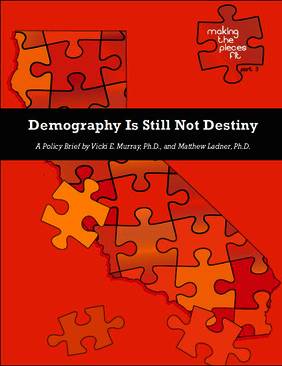Florida ’s low-income, Hispanic, and black fourth graders now outperform all California fourth graders on the National Assessment of Educational Progress (NAEP) reading assessment according to a policy brief released today by the Pacific Research Institute (PRI), a California-based think tank. Demography is Still Not Destiny attributes this striking gap to Florida’s comprehensive education reform efforts combining accountability, transparency, and parental choice. Authors Vicki E. Murray, Ph.D., PRI associate director of Education Studies, and Matthew Ladner, Ph.D., vice president of research at the Goldwater Institute, recommend enacting similar reforms in California.

“In 1998, the year before the Florida reforms began, California and Florida both ranked near the bottom for NAEP scores,” said Dr. Ladner. “After a decade of comprehensive reform, Florida fourth graders rank among the country’s highest performers. Meanwhile, the reading performance of California fourth graders remains stuck near the bottom.”
“Like California, Florida has one of the largest and fastest growing Hispanic populations, and almost half of all students are low-income,” added Dr. Murray. “Turning conventional wisdom on its head, the very students usually blamed for poor statewide public-school performance are actually fueling Florida’s meteoric rise in reading performance.”
Demography is Still Not Destiny outlines Florida’s broad efforts to improve student performance by instituting a variety of curricular and incentive-based reforms, placing pressure both from the top down and the bottom up on schools to improve. Areas that deserve attention include:
- Parental choice
- Social promotion
- Alternative teacher certification
- Curriculum reform
- Letter grades for schools
- Standards weighting
- Literacy reforms
- Performance bonuses for teachers and schools
“California cannot achieve global competiveness through minor tweaks of a largely underperforming system. Moreover, faced with staggering deficits and state debt, Californians can no longer afford a status quo that fails millions of students,” concluded Dr. Murray. “Fortune favors the bold, and a brighter future waits California students if California adults will take stronger action.”
Demography Is Still Not Destiny
Vicki E. Murray
Florida ’s low-income, Hispanic, and black fourth graders now outperform all California fourth graders on the National Assessment of Educational Progress (NAEP) reading assessment according to a policy brief released today by the Pacific Research Institute (PRI), a California-based think tank. Demography is Still Not Destiny attributes this striking gap to Florida’s comprehensive education reform efforts combining accountability, transparency, and parental choice. Authors Vicki E. Murray, Ph.D., PRI associate director of Education Studies, and Matthew Ladner, Ph.D., vice president of research at the Goldwater Institute, recommend enacting similar reforms in California.
“In 1998, the year before the Florida reforms began, California and Florida both ranked near the bottom for NAEP scores,” said Dr. Ladner. “After a decade of comprehensive reform, Florida fourth graders rank among the country’s highest performers. Meanwhile, the reading performance of California fourth graders remains stuck near the bottom.”
“Like California, Florida has one of the largest and fastest growing Hispanic populations, and almost half of all students are low-income,” added Dr. Murray. “Turning conventional wisdom on its head, the very students usually blamed for poor statewide public-school performance are actually fueling Florida’s meteoric rise in reading performance.”
Demography is Still Not Destiny outlines Florida’s broad efforts to improve student performance by instituting a variety of curricular and incentive-based reforms, placing pressure both from the top down and the bottom up on schools to improve. Areas that deserve attention include:
“California cannot achieve global competiveness through minor tweaks of a largely underperforming system. Moreover, faced with staggering deficits and state debt, Californians can no longer afford a status quo that fails millions of students,” concluded Dr. Murray. “Fortune favors the bold, and a brighter future waits California students if California adults will take stronger action.”
Nothing contained in this blog is to be construed as necessarily reflecting the views of the Pacific Research Institute or as an attempt to thwart or aid the passage of any legislation.
Subscribe to our newsletter: